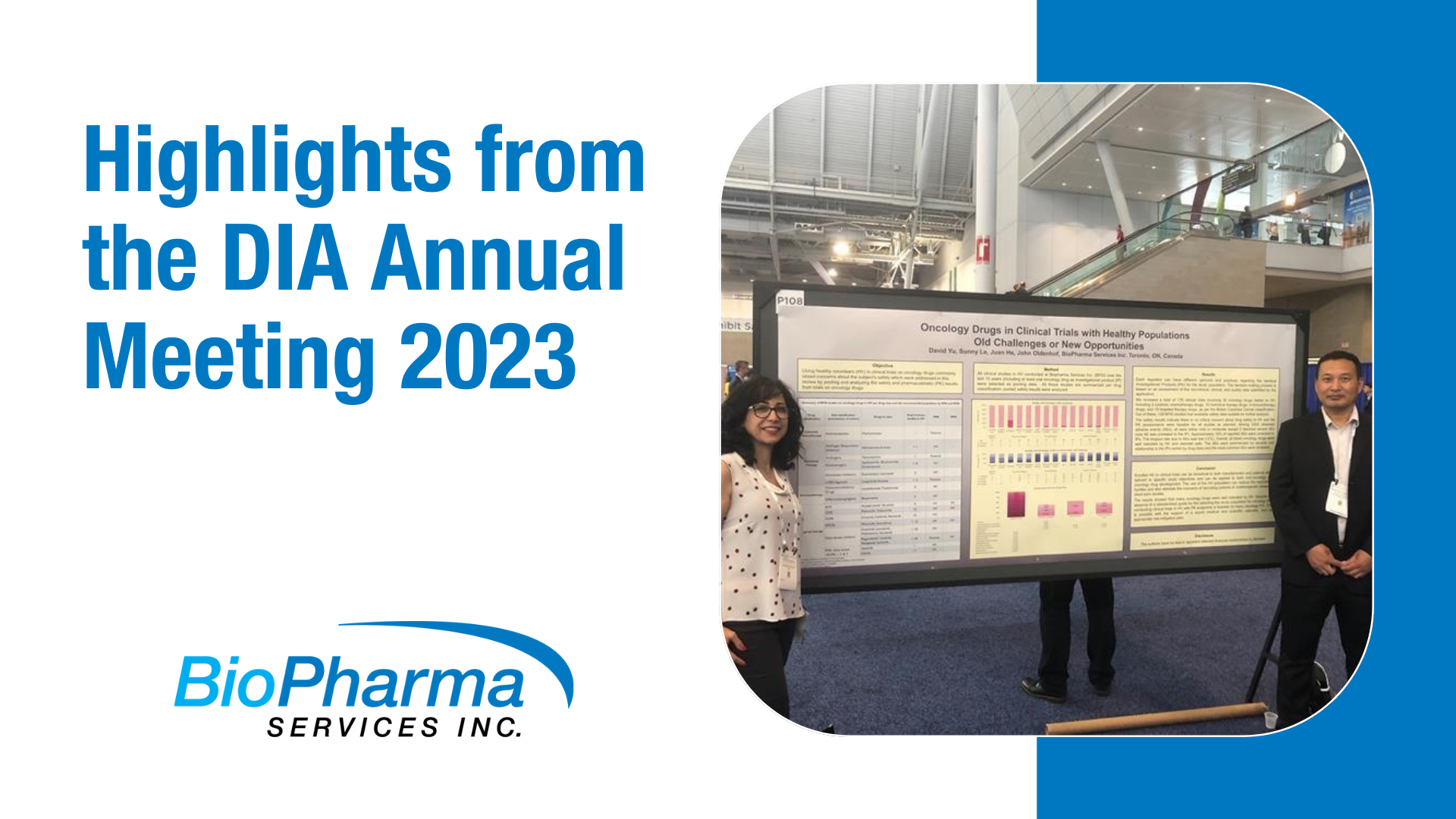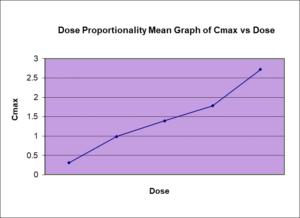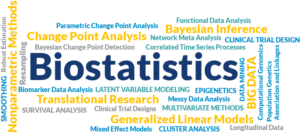BioPharma Services Highlights from the DIA Annual Meeting, 2023

The DIA 2023 Annual Meeting in Boston gathered experts, professionals, and regulators from around the world to discuss and highlight valuable insights into the latest developments in drug development, regulatory affairs, and clinical research. BioPharma Services Inc. (BPSI) also contributed to this year’s annual meeting by presenting the poster regarding the BioPharma Services experience and our achievements in Oncology Drugs in Clinical Trials with Healthy Populations.
The expert-led sessions at the DIA Annual Meeting also helped attendees to gain insights into a variety of fields in clinical research such as Artificial Intelligence (AI) integration, regulatory and ICH updates, patient engagement, and the importance of accelerating medication approvals for rare diseases. Some takeaways from DIA Annual Meeting 2023 in Boston are:
-
- Integrating AI in Clinical Trials and Medical Writing: As technology continues to reshape the life sciences sector, AI took center stage at the DIA Annual Meeting. Discussions revolved around how AI is transforming various stages of clinical trials, from patient recruitment to developing clinical study reports, enhancing efficiency, accuracy, and decision-making processes. Furthermore, AI’s integration into medical writing is revolutionizing document generation, ensuring consistency and accuracy in scientific and regulatory documents.
- Regulatory and ICH Updates and Harmonization: The event featured dedicated sessions focused on specific ICH guidelines, including ICH M11: Clinical Electronic Structured Harmonised Protocol Template. Regulators from prominent agencies such as FDA, EMA, National Medical Products Administration (NMPA), World Health Organization (WHO) and Brazilian Health Regulatory Agency (ANVISA) provided updates, highlighting the importance of modernizing and harmonizing the regulatory process globally.
- Patient-Centric Approaches: Patient engagement and patient-centric approaches emerged as essential focus areas at the DIA Annual Meeting. Novel methods to involve patients in the drug development process were discussed, aiming to improve outcomes and better understand patient needs.
- Accelerating Approval of Rare Diseases Medication: DIA emphasized the urgency of fast-tracking medication approvals for rare diseases. The unique challenges faced by patients with rare conditions demand an expedited approval process. Real-world evidence was promoted as a crucial resource to support such approvals, providing additional evidence of treatment effectiveness and safety. Additionally, DIA supported increased patient engagement in regulatory discussions to prioritize patient needs and preferences.
BioPharma’s Poster Presentation at DIA 2023
Oncology Drugs in Clinical Trials with Healthy Populations: Old Challenges or New Opportunities
To access the entire publication and view the full resolution PDF, Click Here to visit our Scientific Resource Page.
An introduction to oncology drugs study in healthy volunteers in BioPharma Services.
Using healthy volunteers (HV) in clinical trials for oncology drugs commonly raised concerns about subject’s safety. By pooling and analyzing results from trials on oncology drugs conducted at BioPharma Services, the concern was justified against the regulatory recommendations,
All clinical studies in healthy volunteers conducted at BioPharma Services over the last 15 years (including at least one oncology drug as investigational product (IP)) were selected as pooling data. All studies are summarized per drug classification, pooled safety results were analyzed, and Pharmacokinetic (PK) data from a recent study was presented as an example.
Results:
A total of 176 clinical trials on 36 oncology drugs in healthy volunteers were reviewed including 3 cytotoxic chemotherapy drugs, 10 hormonal therapy drugs, 4 immunotherapy drugs, and 19 targeted therapy drugs per British Columbia Cancer classification. A total of 129 BioPharma studies had available safety data that was carried out for further analysis.
The safety results indicate there is no critical concern about drug safety to healthy volunteers, and the PK assessment was feasible for all studies as planned. Among 3300 observed adverse events (AEs), all were either mild or moderate except 3 resolved severe adverse events (one AE was unrelated to the IP). Approximately 18% of reported adverse events were unrelated to IPs. The dropout rate due to adverse events was low (<2%). Overall, all listed oncology drugs were tolerated in healthy volunteers and deemed safe. The AEs were summarized as per severity and relationship to the IP by drug class, and the most common adverse events were reviewed.
Each regulator can have different opinions and practices regarding the identical IP for the study population. The decision-making process is based on an assessment of the non-clinical, clinical, and quality data submitted by the applicators.
For example, FDA has product-specific guidance on which groups should participate in clinical trials for all the drugs we studied, while EMA only has specific guidance for some IPs. For some IPs, FDA recommends using patients for bioequivalence studies, whereas the EMA recommends using healthy volunteers. The agency’s requirement was compared to the studies done in-house and summarized in the below table.
|
Summary of BPSI studies on oncology drugs in HV per drug class and the recommended population by FDA and EMA. |
|||||
| Drug classification |
Sub-classification (mechanism of action) |
Drugs in class | Total studies in HV | FDA | EMA |
| Cytotoxic chemotherapy | Antimetabolites | Methotrexate | 1 | Patients | – |
| Hormonal Therapy | Androgen Biosynthesis Inhibitors | Abiraterone Acetate | > 1 | HV | – |
| Androgens | Testosterone | 1 | Patients | – | |
| Antiandrogens | Apalutamide, Bicalutamide, Enzalutamide | > 8 | HV | – | |
| Aromatase Inhibitors | Exemestane, Letrozole | 5 | HV | – | |
| LHRH Agonists | Leuprolide Acetate | > 2 | Patients | – | |
| Immunotherapy | Immunomodulatory Drugs | Lenalidomide, Thalidomide | 9 | HV | – |
| Differentiating Agents | Bexarotene | 2 | HV | – | |
| Targeted therapy | BTK | Acalabrutinib1, Ibrutinib | 9 | HV | HV |
| CDK | Ribociclib1, Palbociclib | 10 | HV | HV | |
| EGFR | Erlotinib, Gefitinib, Neratinib | 10 | HV | – | |
| MTOR |
Ribociclib Everolimus |
> 10 | HV | HV | |
| Multi-kinase inhibitor | Dasatinib, Lenvatinib, Midostaurin, Sorafenib | > 20 | HV | – | |
| Regorafenib1, Imatinib, Pazopanib, Sunitinib, | > 30 | Patients | HV | ||
|
PI3K delta kinase VEGFR 1, 2, & 3 |
Idelalisib | 1 | HV | – | |
| Axitinib | > 5 | HV | – | ||
|
HV: healthy volunteers population is recommended. Patients: patients population with the indicated condition is recommended. – : no product-specific guidance is available. 1: no EMA product-specific guidance |
|||||
In the case of Pazopanib, for example, FDA recommends patients undergo bioequivalence studies, whereas EMA recommends healthy volunteers. From the past 08 bioequivalence studies in healthy volunteers, approximately 370 subjects were dosed with 200 mg or 400 mg of Pazopanib, all adverse events were mild or moderate, and the most common adverse events (≥10%) were somnolence, headache, and nausea. Among all dosed subjects, 4 subjects (1.08%) did not complete their studies due to safety reasons. The PK profiles of Pazopanib were all well characterized.
Why Choose BioPharma Services for Oncology Clinical Trials?
BioPharma Services has extensive experiences in oncology drugs clinical trials tailored to different regulatory agencies. Among all the clinical trials on oncology drugs conducted by BioPharma Services, only one drug (methotrexate) belongs to cytotoxic chemotherapy based on drug classification, other drugs falling into the category of hormonal therapy, immunotherapy, and targeted therapy, the largest percentage was targeted therapy drugs acting on different kinases.
Recruitment of healthy volunteers in clinical trials can be beneficial to both manufacturers and patients when adapted to specific study objectives, and can be applied to both non-oncology and oncology drug development. The enrollment of the healthy volunteer populations can not only reduce the recruitment obstacles but also mitigate the medical ethics of recruiting patients with disease at subtherapeutic doses for short-term studies.
The use of healthy volunteers in the clinical development of oncology drugs is more limited compared to non-oncology drugs but is still useful for assessing PK, drug metabolism, food effects, potential drug interactions, effects of hepatic and renal impairment, and other pharmacological parameters critical to clinical decision-making. However, assessment of pre-known toxicity and pharmacology before planning the clinical trials in healthy volunteers and/or patients is critical to ensure the safety of all participants.
BioPharma Services’ experience showed that many oncology drugs were well tolerated in healthy volunteers. Despite the lack of a standardized guide for the study population for oncology IPs, clinical trials in healthy volunteers with PK endpoints are feasible for many oncology IPs with the support of adequate medical, scientific rationale, and appropriate risk mitigation plan.
If you are interested in studies on oncology drugs and would like to discuss further, please a Schedule a Discovery Call below and an expert Pharmacometrics team member will be happy to discuss our capabilities with you.
Find out why BioPharma might be the right partner for you! Learn more about BioPharma Services and the wide array of bioanalytical services we provide.
Written By: David Yu, Pharmacokinetic Associate and Negar Gharavi, Senior Director, Medical Writing & Regulatory Affairs
BioPharma Services, Inc., a Think Research Corporation and clinical trial services company, is a full-service Contract Clinical Research Organization (CRO) based in Toronto, Canada, specializing in Phase 1 clinical trials 1/2a and Bioequivalence clinical trials for international pharmaceutical companies worldwide. BioPharma has clinical facilities both in the USA and Canada with access to healthy volunteers and special populations.



